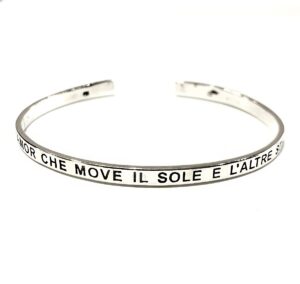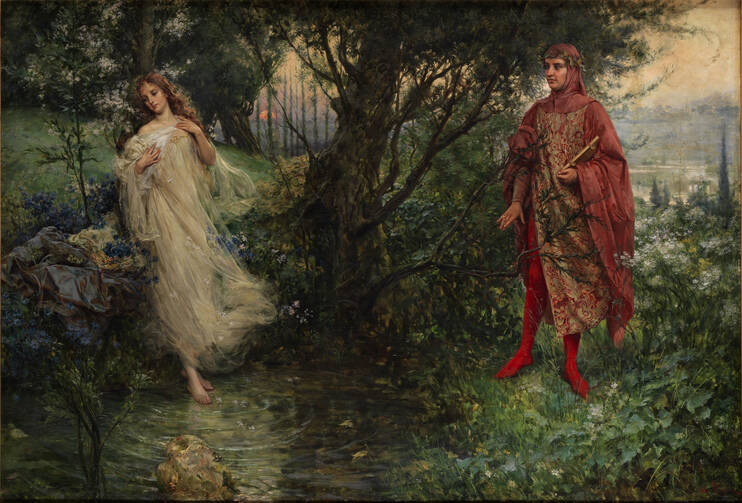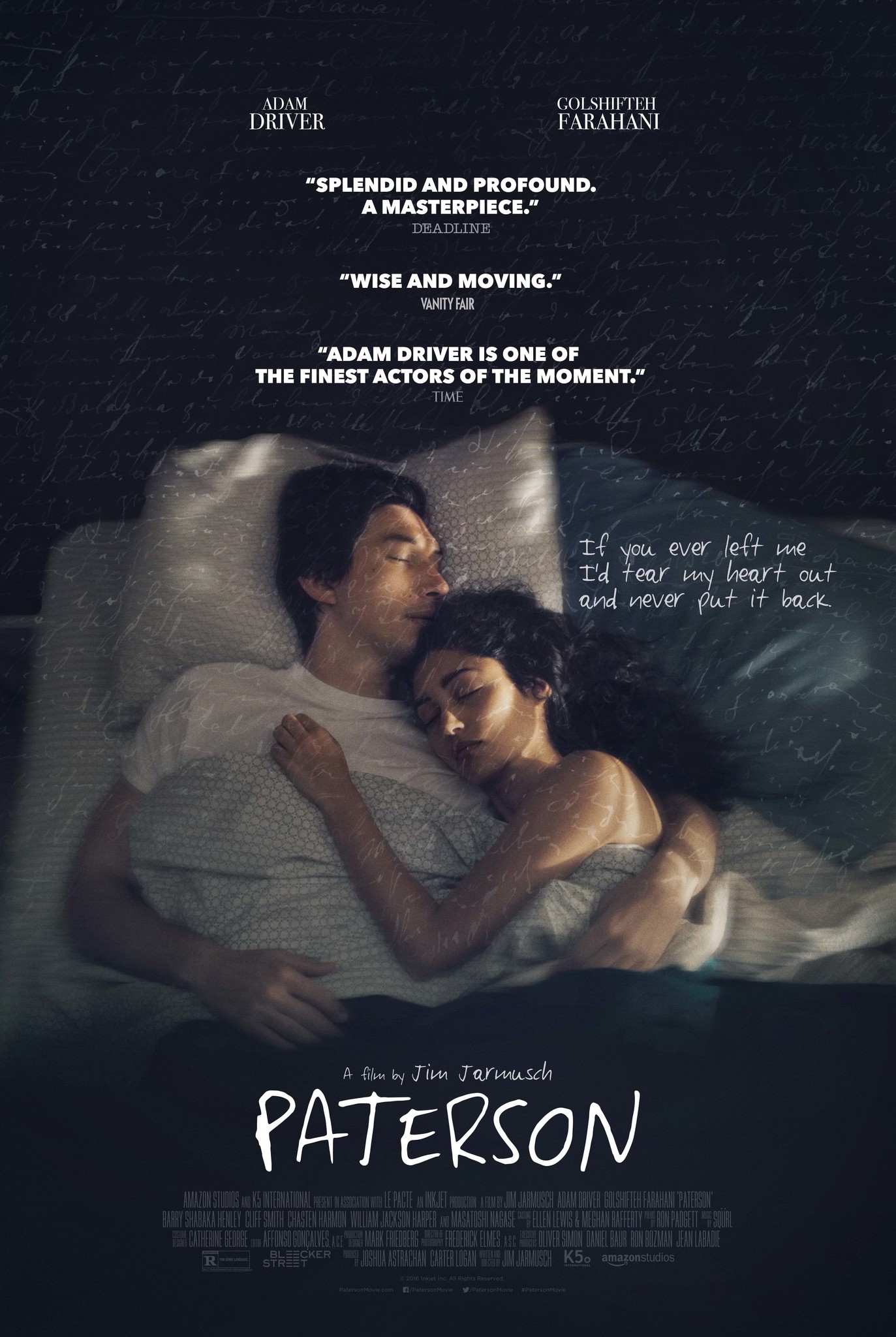
“Parole che risvegliano emozioni.
Parole che senti tue e che desideri condividere.
Parole come gioielli da indossare.” —”Gioielli di Pace, bracciale: ‘L’Amor che move il sole e l’altre stelle,'” Shanti Gioielli, (retrieved, March 20 2024)
Citings & Sightings of Dante's Works in Contemporary Culture

“Parole che risvegliano emozioni.
Parole che senti tue e che desideri condividere.
Parole come gioielli da indossare.” —”Gioielli di Pace, bracciale: ‘L’Amor che move il sole e l’altre stelle,'” Shanti Gioielli, (retrieved, March 20 2024)
Tumblr post by user Florence Leyret Photography captioned a post with the last line of Paradiso —Florence Leyret, “The love that moves the sun and the other stars…,” Tumblr, February 4, 2017 (retrieved February 29, 2024)
By Sofia Nuonno

“To borrow a phrase from Paul McCartney, is the Paradiso only ‘another silly love song’? Is Dante no more than a 14th-century romantic, employing a trope someone such as Irving Berlin would make even more famous in the 20th century, that being in love is like being in heaven?
“Or has this deeply Catholic poet identified a key element in the meaning of Easter, that love alone grants access to heaven, just as only those who loved Christ could see his resurrected glory?” — Terrance Klein, “Easter Is an Invitation to Fall in Love”, America Magazine, April 5, 2023
 “Paterson (dir. Jim Jarmusch, 2016) is an Amazon Prime original film about a bus driver named Paterson (Adam Driver) who writes poetry in his free times and on his breaks from work, though his only audience for them is his wife Laura (Golshifteh Farahani). The movie follows the bus driver/poet on a weeklong journey of everyday experiences, watching him observe the sights, sounds, and people of the town of Paterson, New Jersey. During the first day, the film shows Paterson sitting down to eat his lunch which was packed by his wife, and shows that she had put a Dante Alighieri postcard in it, which he looks at and acknowledges verbally before eating his lunch and writing his own poetry.” –Contributor Robert Alex Lee
“Paterson (dir. Jim Jarmusch, 2016) is an Amazon Prime original film about a bus driver named Paterson (Adam Driver) who writes poetry in his free times and on his breaks from work, though his only audience for them is his wife Laura (Golshifteh Farahani). The movie follows the bus driver/poet on a weeklong journey of everyday experiences, watching him observe the sights, sounds, and people of the town of Paterson, New Jersey. During the first day, the film shows Paterson sitting down to eat his lunch which was packed by his wife, and shows that she had put a Dante Alighieri postcard in it, which he looks at and acknowledges verbally before eating his lunch and writing his own poetry.” –Contributor Robert Alex Lee
Contributed by Robert Alex Lee (Florida State University, MA 2024)
 “Concebido como un libro que puede leerse solo, como acompañante a la lectura de La Comedia, como una nueva narración de la historia original o como una interpretación de la misma, el autor parte de una premisa y una frustración: ‘La Divina Comedia cambia vidas’, comienza diciendo en la Introducción y así lo han experimentado lectores desde comienzos del siglo XIV. No obstante, ‘también ha habido lectores inseguros de cómo entender su ingenio’, abrumados ante el desafío de los textos que pueden revelar más vida cada vez que se leen, una vez se encuentra la vía de entrada a su laberinto. El problema es que, en la mayoría de ediciones contemporáneas, Vernon ha encontrado que los autores no están interesados en la obra que, en sus palabras, cataliza una transformación espiritual.
“Concebido como un libro que puede leerse solo, como acompañante a la lectura de La Comedia, como una nueva narración de la historia original o como una interpretación de la misma, el autor parte de una premisa y una frustración: ‘La Divina Comedia cambia vidas’, comienza diciendo en la Introducción y así lo han experimentado lectores desde comienzos del siglo XIV. No obstante, ‘también ha habido lectores inseguros de cómo entender su ingenio’, abrumados ante el desafío de los textos que pueden revelar más vida cada vez que se leen, una vez se encuentra la vía de entrada a su laberinto. El problema es que, en la mayoría de ediciones contemporáneas, Vernon ha encontrado que los autores no están interesados en la obra que, en sus palabras, cataliza una transformación espiritual.
“’El mayor riesgo es tomar La Comedia muy literalmente, como si Dante estuviese hablando de una fácil transferencia a la realidad’. Sí hay un significado literal, reconoce Vernon, pero es la capa superficial del texto que a su vez entraña toda una elaboración metafórica: ‘Y esto es realmente lo que lo confunde a uno, lo reta, las contradicciones. Pero al mismo comunica algo de aquella misma revelación inicial’. El autor también reconoce el carácter alegórico del poema, que se relaciona con las implicaciones morales y el significado religioso de la peregrinación, pero concentra su trabajo en la ‘transformación revolucionaria que ocurre a lo largo del camino, y la manera en el cual Dante describe estos continuos cambios’.
[. . .]
“‘Esto se relaciona también con el amor, que es desear lo que es bello’.” –“Mark Vernon: Dante, Carlos III, las palabras y los significados,” El Exquisito (May 17, 2023)
Read the full interview here (Spanish language; subscription required).
Contributed by Joshua Roberts
All submissions will be considered for posting. Bibliographic references and scholarly essays are also welcome for consideration.
Coggeshall, Elizabeth, and Arielle Saiber, eds. Dante Today: Citings and Sightings of Dante’s Works in Contemporary Culture. Website. Access date.